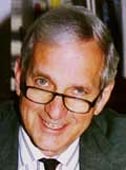EDITOR'S COLUMN
Surgeon Ethicists

Martin McKneally
|
Chairman Jim Rutka’s column celebrates
the approval of new pathways
to academic promotion in our
department. The Global Surgery
path has been recently described
(see 2016 Surgical Spotlight article) and will
receive more attention in the
spring. I will describe here some
of the work of our surgeon-ethicists, to give readers a sense
of where this new path leads.
Mark Bernstein, our first executive MHSc bioethics
scholar, completed his Bioethics Master’s degree while
serving simultaneously as UHN Division Chief of
Neurosurgery. His energetic teaching and research has
brought neurosurgical residents, fellows and faculty into
surgical ethics, and enriched the education of a broad
range of graduate and undergraduate students.
Senior Neurosurgery resident Nir Lipsman, Division
Chair Andres Lozano, and Mark Bernstein are charting
the unfathomed ocean of ethical issues in deep
brain stimulation for an expanding range of conditions
– including anorexia nervosa, memory loss, and intractable
depression. For example, in a seminal article in the
journal Bioethics, the question is examined whether the
device or the patient is the source of volition. Nir writes:
“The stimulation device releases constraints imposed [by
depression] and restores [the] experience of being in control
of... behaviour…. It is thus compatible with distinct
philosophical conceptions of free will…if one’s desires to
act are too weak to develop into plans of action, then DBS
may be able to enhance these desires and thereby facilitate
the performance of actions one wants to perform. In
this respect, the stimulation device can enable one to be
an agent in the fullest sense.” [Lipsman N, Glannon W.
Brain, Mind and Machine. Bioethics 2013; 27:465-470.]
Senior General Surgery resident Megha Suri’s moral
reasoning about truth-telling in the setting of a poor prognosis
provided surgeons with a nuanced and more realistic
account of the spectral nature of truth-the ‘objective’ truth
revealed by brain imaging of metastases, the subjective versions
of the truth – one known by the family that mother
shouldn’t be told for various reasons known best by them,
and another known by the patient -that she is dying,
and doesn’t want or need punitive disclosure of technical
details learned through tests. [Suri M, McKneally M,
Devon K. Tragic Knowledge. World J Surg 2014;38:1626-
1630.] Working with endocrine surgeon Karen Devon,
Megha underlined the importance of maintaining hope
while harboring tragic knowledge, and taught us that the
half-life of surgical truth is 45 years.
|
Colorectal surgeon Ryan Snelgrove, working with
Karen, is evaluating the effectiveness of “Ethics M&M”
as a technique of integrating ethics teaching and learning
into the experience of surgeons in their familiar and
trusted conference venue- instead of a separate event like
an ethics lecture.
Pediatric orthopedic surgeon-ethicist Mark Camp
studies patients’ views about conflicts of interest that
arise when surgeons work with industry.[Camp MW,
et al. Patients’ views on surgeons’ financial conflicts of
interest. J Bone Joint Surg AM 2013;95:e9(1-8)] With
colleagues at the Hospital for Sick Children, he is also
developing web-based decision aids to help anxious
parents better understand the operations their children
require in the frightening setting of traumatic injury.
Mark, Ryan, and Karen have organized three Surgical
Ethics courses in the Department. The 2017 version
is advertised nearby. It will include analyses of interesting
ethical questions such as “What is the Global
Surgeon’s moral responsibility for the management of
post-operative complications that arise long after leaving
the patient in Africa?” “Can Medical Assistance in
Dying provide a source of organs for transplantation?
Will altruism confuse the motivation of patients seeking
to end their lives? Will trust in the reliability of anesthesia
in the Operating Room enhance the attractiveness of
donation as a way to terminate unbearable suffering?”
Congratulations to our Chair and the advisory group
of surgeons who are advancing the programs of Surgical
Ethics and Global Surgery by formal recognition, as the
Department has done so well with Surgeon Scientist and
Surgeon Educator programs. They have established the
reputation of the Department, recognized by our recent
enthusiastic external review, as one of the leading academic
surgical centres in the world.
MM
|